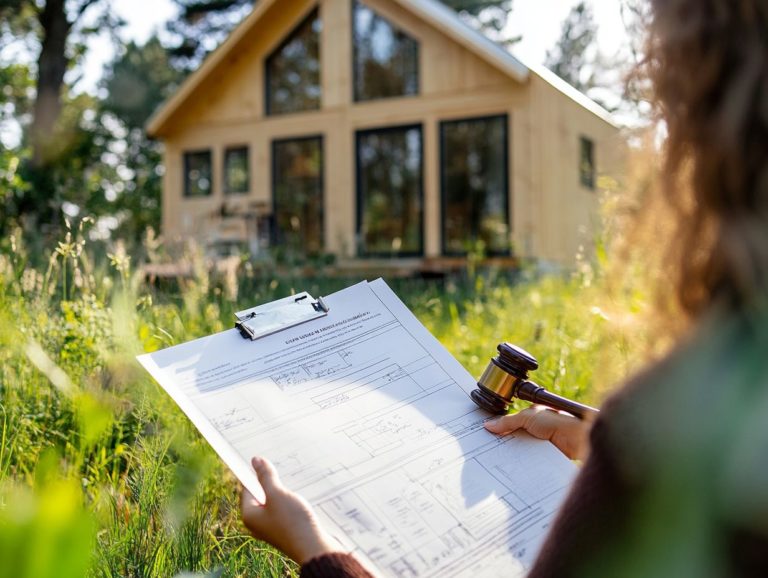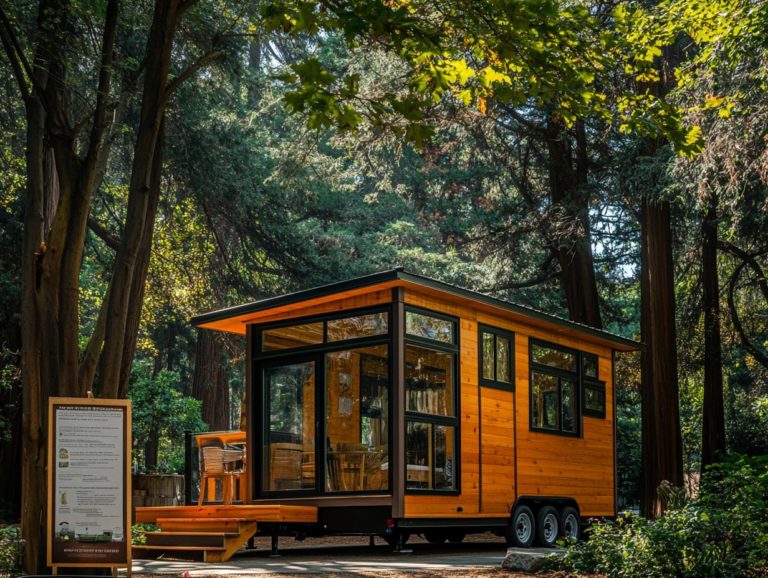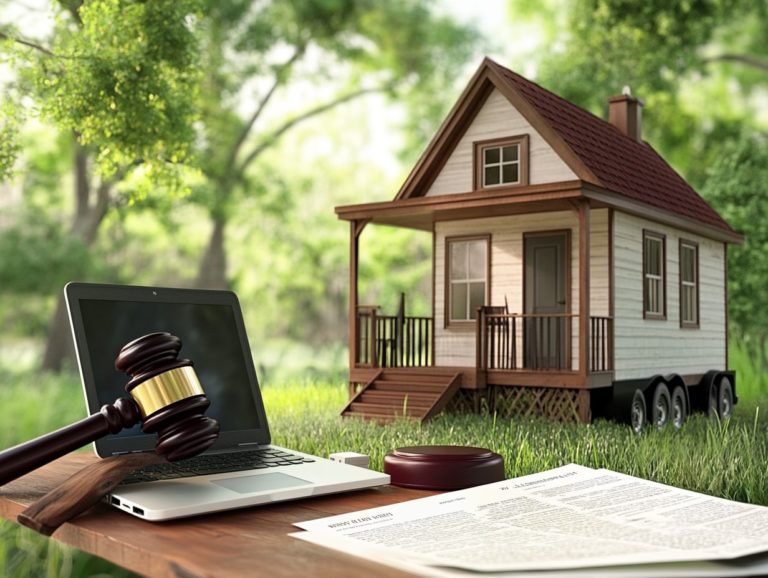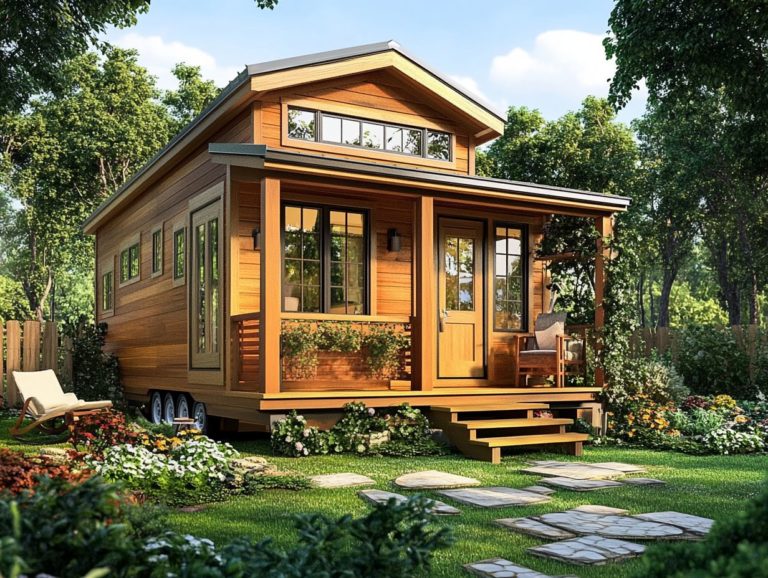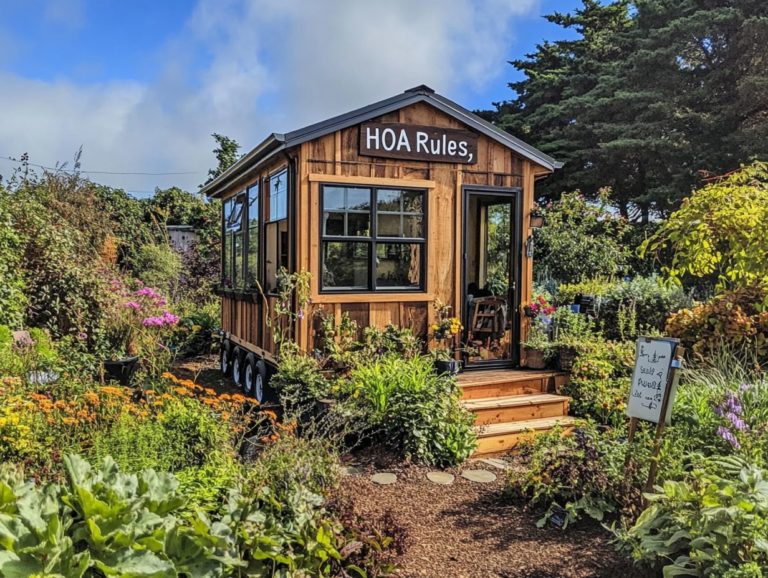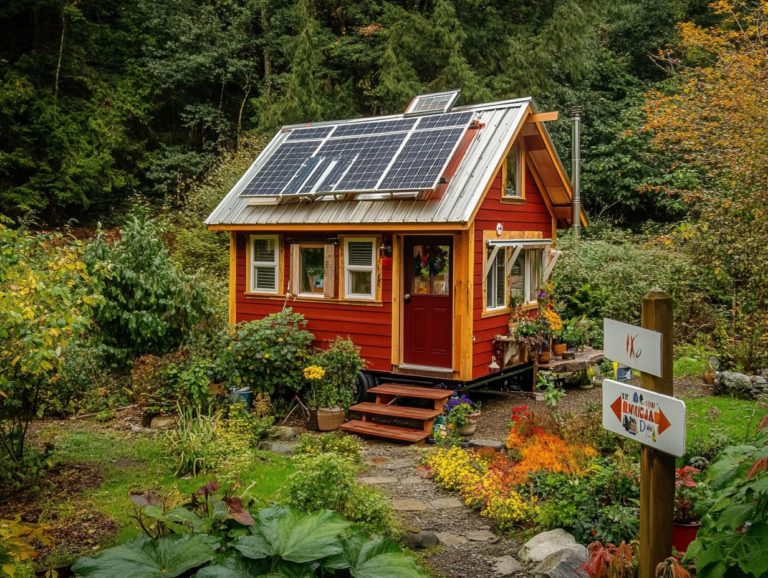How to Find Legal Tiny House Communities
Are you intrigued by the rising trend of tiny house communities? These distinctive living arrangements promote minimalist lifestyles and cultivate a strong sense of belonging.
This article delves into the numerous benefits of residing in these communities, highlighting the support they provide and their commitment to sustainable practices. It addresses essential legal considerations, such as zoning laws dictating land use and building codes ensuring safety standards guiding you on how to locate legitimate tiny house communities.
You will also explore important factors to consider when selecting the ideal community for yourself. Step into the enchanting world of tiny house living!
Contents [hide]
- Key Takeaways:
- Benefits of Living in a Tiny House Community
- Legal Considerations for Tiny House Communities
- How to Find Legal Tiny House Communities
- Criteria for Choosing a Tiny House Community
- Frequently Asked Questions
- What are tiny house communities and how can I find them?
- Are all tiny house communities legal?
- What should I consider when looking for a legal tiny house community?
- Can I build my own tiny house in a legal tiny house community?
- Are there any online resources for finding legal tiny house communities?
- Can I live in a tiny house community permanently?
Key Takeaways:
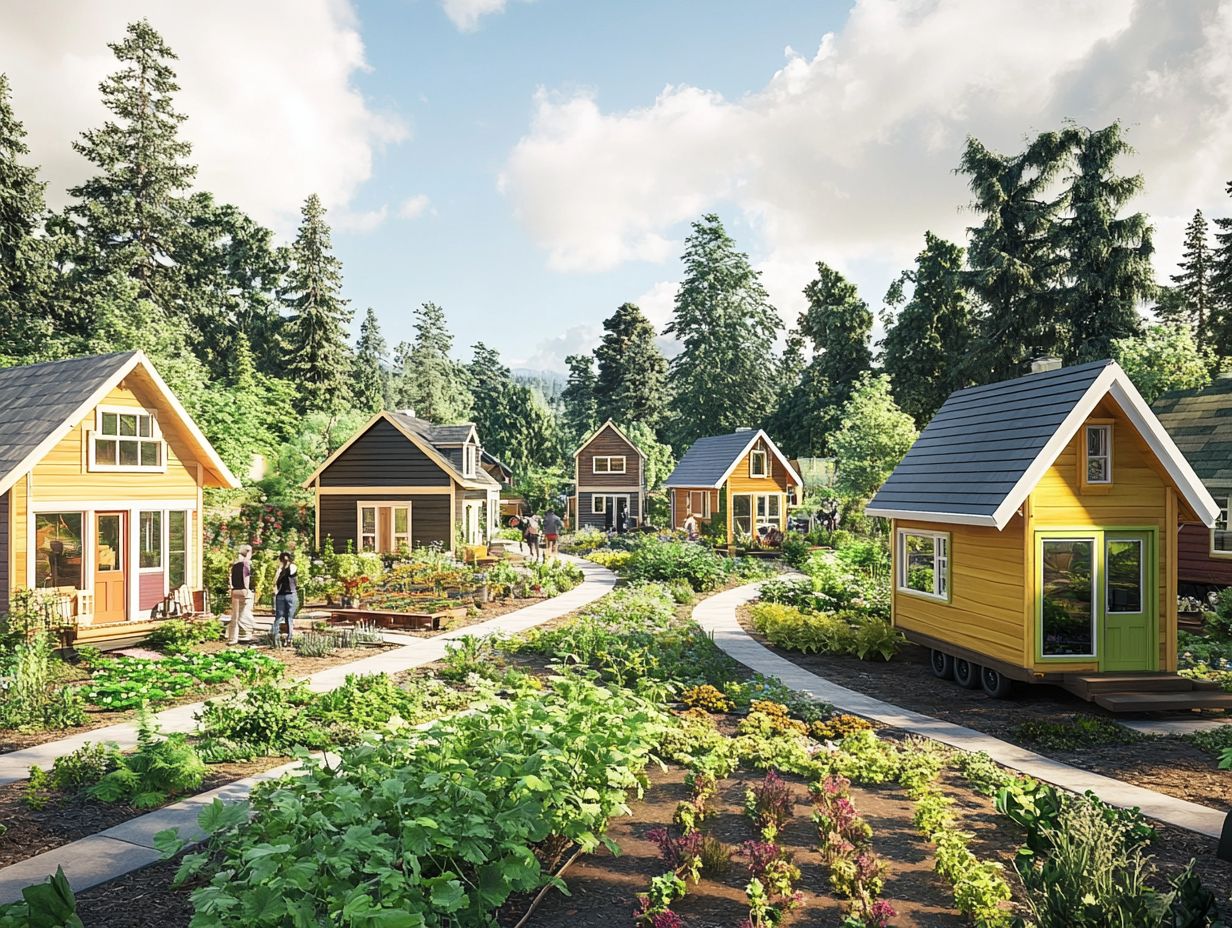
What are Tiny House Communities?
Tiny house communities, especially in Washington State, emerge as innovative solutions within the small house trend, offering a unique blend of affordable housing, sustainable living, and a genuine sense of community. These vibrant neighborhoods consist of tiny homes designed to maximize living space while minimizing environmental impact.
Here, you have the chance to embrace a simpler lifestyle that prioritizes sustainability and fosters community support. You will often find shared gardens, communal kitchens, and recreational spaces that encourage connections among neighbors who share your values.
For instance, Washington State hosts remarkable developments like the Tiny House Village in Seattle, showcasing how micro-housing clusters can successfully promote environmental conservation. Residents adopt eco-friendly practices such as rainwater collection and solar energy, reinforcing their commitment to sustainable living. This aligns with insights from the future of tiny house communities.
These features create a more considerate way of life and attract individuals seeking an affordable alternative to conventional housing, making tiny house communities in Florida an appealing option for many.
Benefits of Living in a Tiny House Community
Living in a tiny house community presents a wealth of advantages, including affordability, sustainability, and a rich tapestry of community support that nurtures neighborly connections and collaboration.
The compact design of tiny homes naturally encourages eco-friendly living. The shared spaces within these communities enhance social interactions and provide access to collective resources.
This cooperation creates a supportive environment, allowing you to thrive both individually and as part of a tight-knit community.
Community Support and Sustainable Living
Community support in tiny house communities is essential for fostering a sustainable living environment. Here, you can share resources and engage in eco-friendly practices. This collaboration enhances your quality of life and inspires innovative solutions to common challenges faced by those embracing a tiny home lifestyle.
For instance, consider how many tiny house neighborhoods implement communal gardens. Here, you can cultivate organic produce, reducing reliance on store-bought goods and promoting healthier eating habits. Additionally, exploring the dynamics of tiny house communities can provide valuable insights into community living and shared resources.
These communities often organize workshops on sustainability topics think solar energy installation or composting techniques allowing you to learn valuable skills while bonding with your neighbors. Pooling tools like lawnmowers and gardening equipment minimizes overall consumption and fosters a spirit of cooperation.
These initiatives reduce environmental footprints and create a sense of belonging that enriches your life and the lives of everyone involved.
Legal Considerations for Tiny House Communities
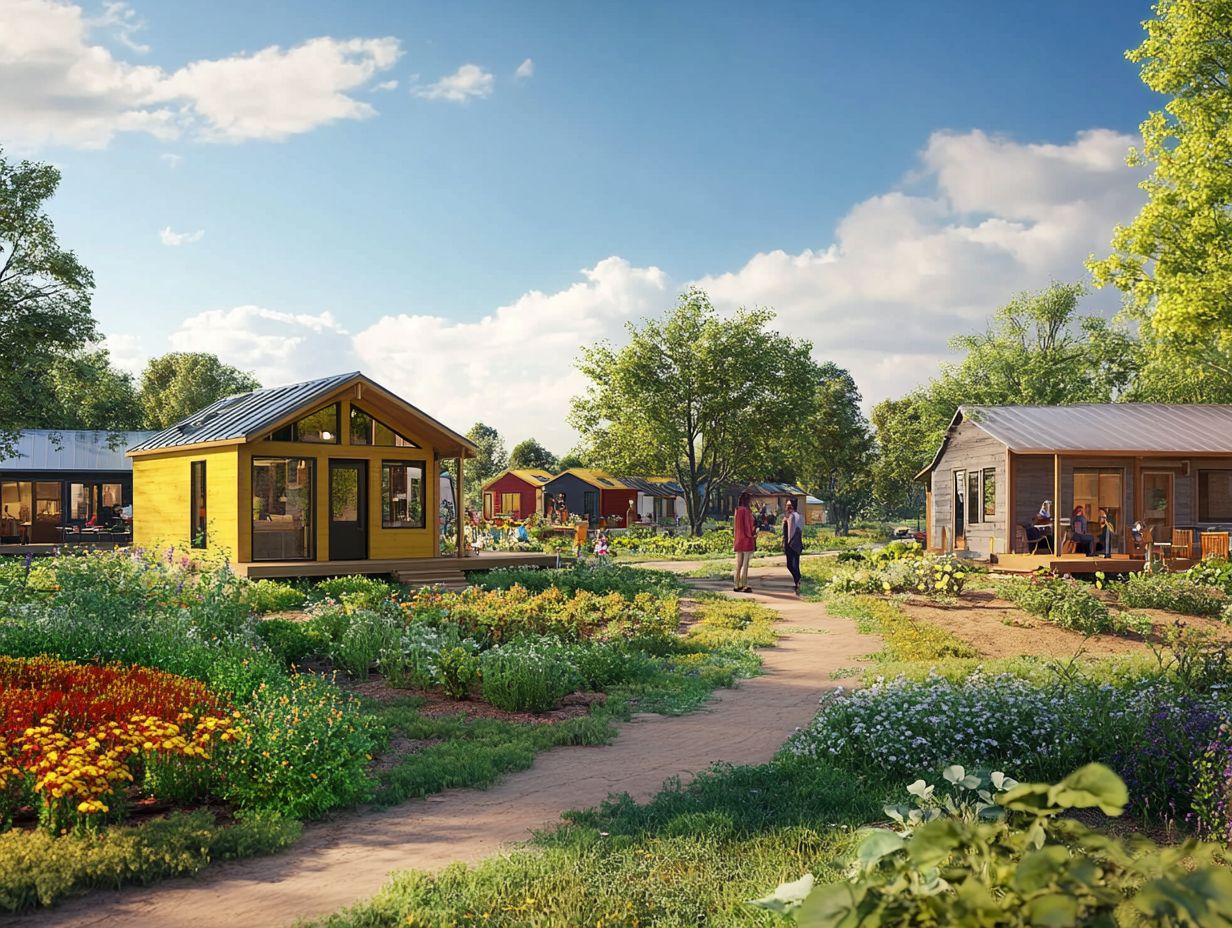
Navigating the intricate legal landscape of tiny house communities requires a keen understanding of the diverse regulations and building codes that vary across local jurisdictions, especially in Washington State.
It’s essential for you, whether as a resident or a tiny home builder, to follow the Washington State Building Code and other pertinent legal frameworks, such as Tiny House Bill 5383. This ensures that your structures align with safety and zoning requirements, which are the rules about how land can be used, safeguarding both your investment and peace of mind. If you’re considering this lifestyle, you may also want to explore how to start a tiny house community.
Zoning Laws and Building Codes
Zoning laws and building codes are crucial in shaping the establishment and regulation of tiny house communities. They dictate where and how these remarkable living structures can be placed. It s vital for you, as a tiny home builder or prospective resident, to understand the specific regulations upheld by local building authorities in Washington counties. This knowledge helps you sidestep any potential legal snags.
Regulations vary greatly from one area to another, influencing not just the design and placement of these dwellings but also how well they integrate into existing neighborhoods. For example, King County has started embracing more flexible zoning options that make room for innovative small living spaces. Conversely, Snohomish County imposes stricter codes that may limit the number of tiny homes permitted on a single property, thus affecting the growth potential of these communities. If you’re exploring living options, consider checking out the best tiny house communities for retirees.
If you’re an aspiring tiny home dweller, it’s essential to dive deep into your local laws and adjust your plans accordingly. Additionally, exploring unique tiny house communities around the world can provide inspiration and guidance. This proactive approach will help you navigate the complexities of this evolving housing landscape with confidence.
How to Find Legal Tiny House Communities
Locating legal tiny house communities necessitates diligent research and strategic networking. This will help you pinpoint regions where tiny home policies are supportive and regulations are favorable.
You can take advantage of online platforms, local resources, and community outreach to uncover established tiny house communities that align with local regulations and zoning laws.
Researching and Networking
Researching and networking are essential steps in your quest to discover suitable tiny house communities. These efforts enable you to connect with tiny home builders and like-minded residents who share your passion. Engaging with local jurisdictions and participating in online forums can yield valuable insights into available properties, community guidelines, and potential challenges associated with tiny house regulations.
Utilizing online resources, such as dedicated websites and social media groups, opens the door to enriching conversations with seasoned tiny house enthusiasts. Attending local workshops allows you to learn from experts while building relationships with others in the movement. By joining community meetups, you can fully immerse yourself in the culture of tiny house communities and potentially uncover partnerships for your projects.
These activities will not only expand your knowledge but also help you cultivate a supportive network, making your journey toward living off-grid in tiny house communities both rewarding and enjoyable.
Criteria for Choosing a Tiny House Community
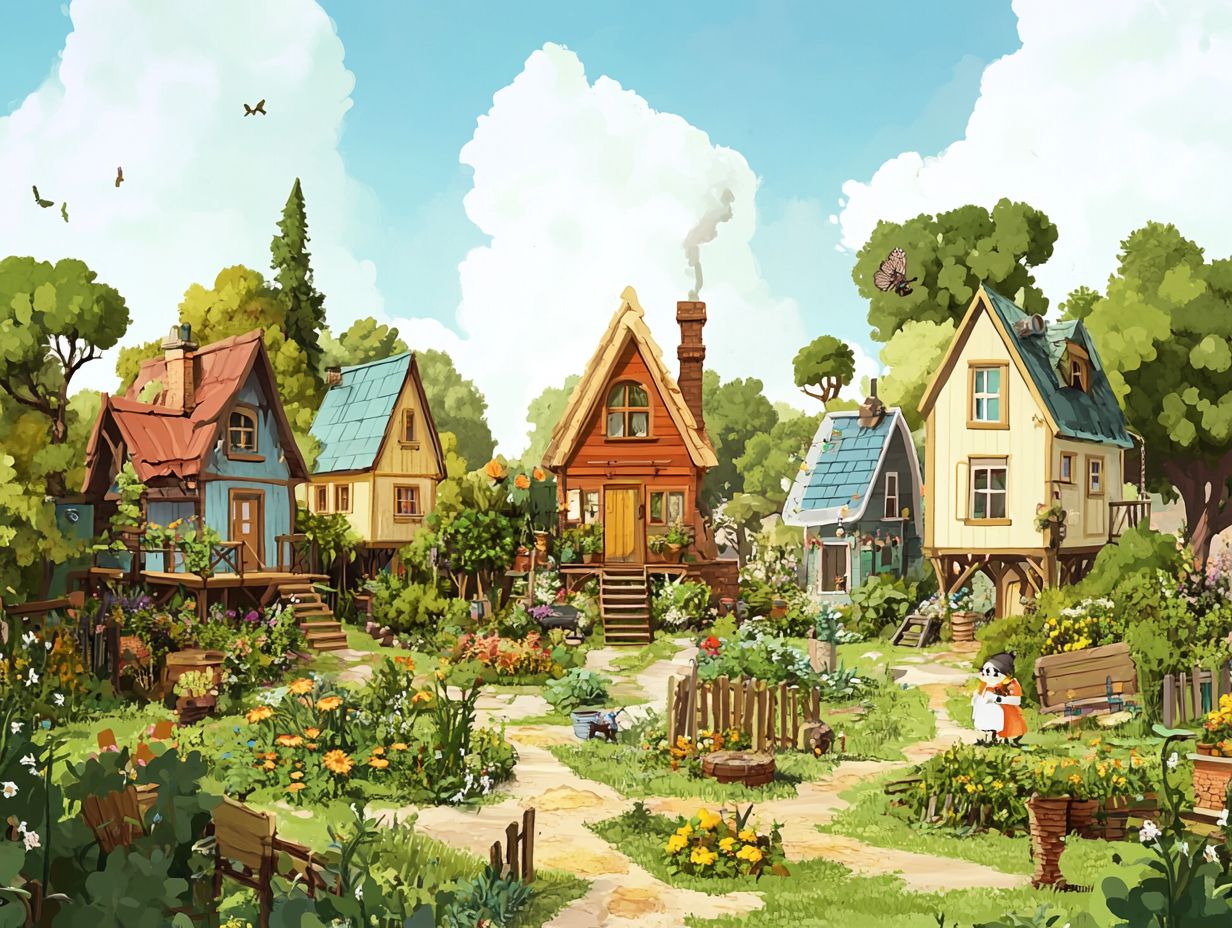
Selecting the ideal tiny house community requires careful consideration of several key factors, such as the location, available amenities, and community guidelines that resonate with your sustainable living philosophy.
Be sure to check how close you are to essential services, recreational opportunities, and the overall culture of the community. It’s crucial for a satisfying living experience!
Start your search today and find your dream tiny home community before it s too late!
Location, Amenities, and Community Guidelines
When evaluating a tiny house community, you ll find that location and amenities are important factors that can greatly shape your living experience. A desirable location not only offers convenience but also boosts your potential for living in an eco-friendly way.
Clear community guidelines help create a supportive atmosphere among residents. Think about how the proximity to urban centers or natural landscapes aligns with your personal lifestyle goals.
If you thrive on outdoor activities, for instance, you might prioritize a community that s nestled near parks or hiking trails.
Amenities like communal gardens, workshops, or social spaces can significantly enhance your quality of life, fostering interactions and shared interests among residents.
Understanding community guidelines is just as crucial; these rules help everyone live happily together and may cover aspects like noise levels, property maintenance, or the use of communal resources.
Engaging with current residents or attending community meetings can provide you with valuable insights. For new residents, exploring tips for tiny house communities ensures you choose a setting that truly feels like home.
Frequently Asked Questions
What are tiny house communities and how can I find them?
Tiny house communities are neighborhoods designed for small, compact homes. These communities offer a unique and alternative living option for those looking to downsize and simplify their lives.
To find legal tiny house communities, you can research online, reach out to local government agencies, or join online forums and communities dedicated to tiny house communities.
Are all tiny house communities legal?
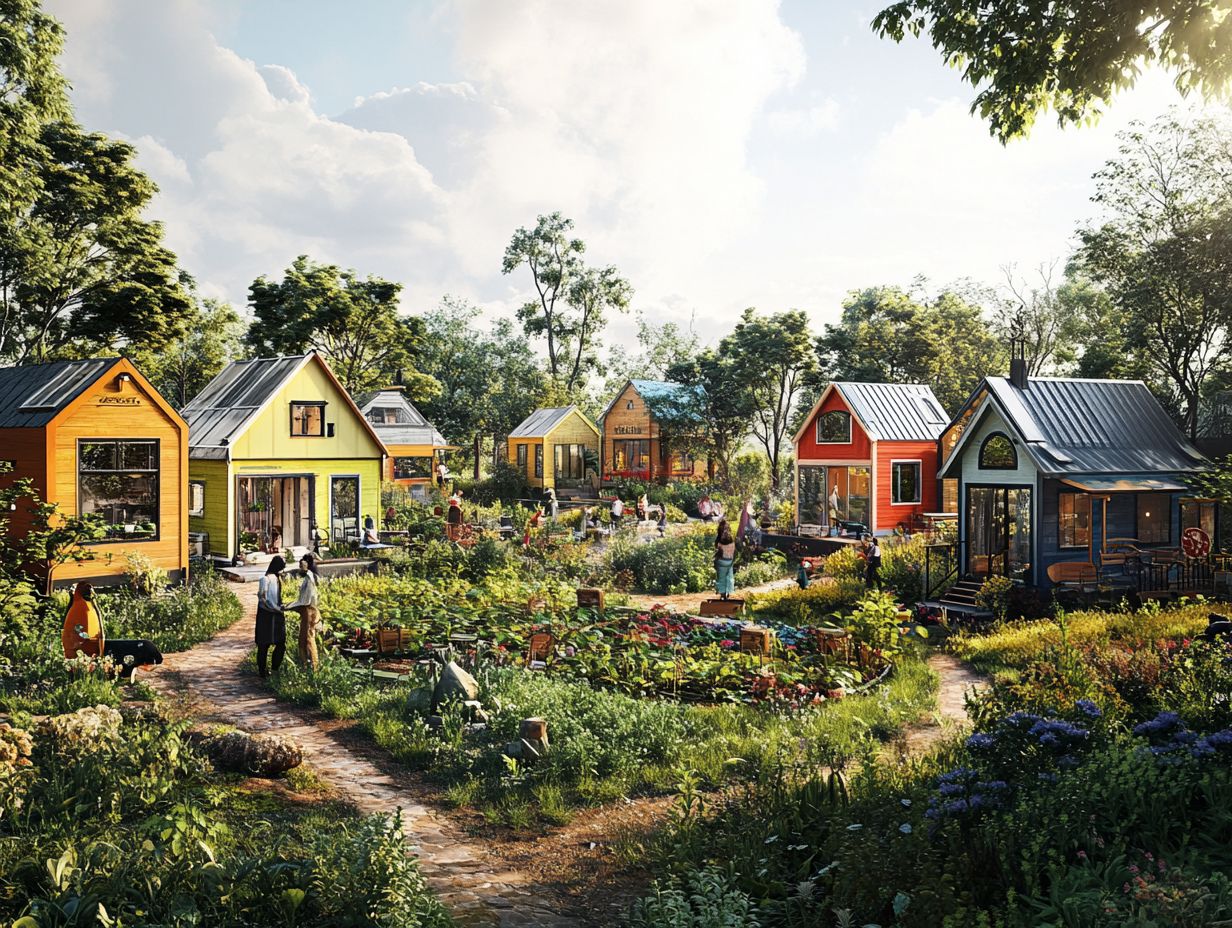
No, not all tiny house communities are legal. Some may be built without proper permits or local laws about where you can build homes, which can lead to legal issues.
It is important to do thorough research and ensure the community you are interested in is compliant with local laws and regulations.
What should I consider when looking for a legal tiny house community?
When searching for a legal tiny house community, consider the location, local laws about where you can build homes, amenities offered, and cost of living.
Also, look into the community’s reputation and talk to current residents to better understand the community’s culture and lifestyle.
Can I build my own tiny house in a legal tiny house community?
It depends on the specific regulations and rules of the community. Some communities may allow residents to build their own tiny houses, while others may only allow pre-built homes or homes built by approved contractors.
It is important to clarify this information before committing to a community.
Are there any online resources for finding legal tiny house communities?
Yes, there are several websites and online forums dedicated to tiny house living and finding legal tiny house communities. Some popular resources include Tiny House Community, Tiny House Village, and Tiny House Listings.
These websites offer information on available communities and connect you with other tiny house enthusiasts.
Can I live in a tiny house community permanently?
Most tiny house communities offer long-term or permanent living options. However, check with the community’s rules and regulations to see if there are any restrictions on the length of stay.
Some communities may have limitations on how long residents can stay to maintain a sense of diversity and turnover within the community.

